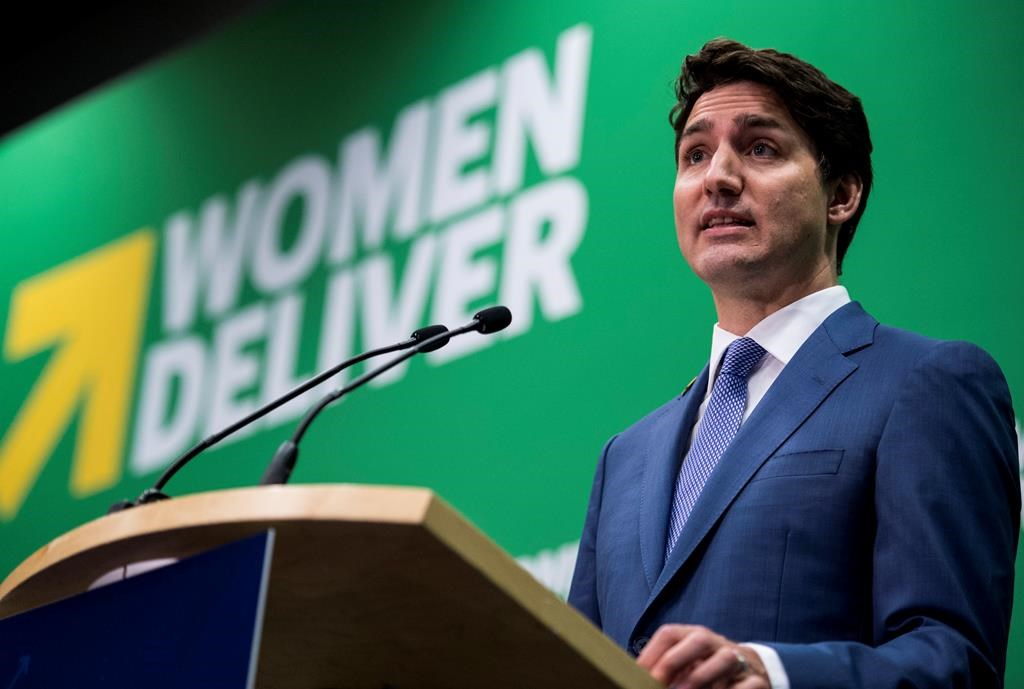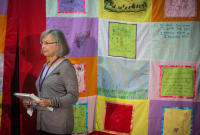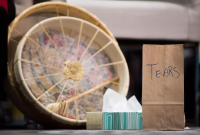Support strong Canadian climate journalism for 2025
Prime Minister Justin Trudeau said Tuesday he accepts the finding that Canada's treatment of missing and murdered Indigenous women and girls amounts to genocide.
Debate has erupted over the definition of the term after the National Inquiry into Missing and Murdered Indigenous Women and Girls repeatedly used it in its final report released Monday.
But people are wrapped up in the use of the powerful word, when the focus should be on how to put an end to the issues raised by the inquiry, Trudeau said.
"Our focus is going to be, as it must be, on the families, on the communities that have suffered such loss."
Trudeau said the tragedy of not treating cases of missing and murdered Indigenous women as a priority has to end.
"Our focus is on bringing together people to solve this challenge and that is what we will remain focused on."
The impact on these families is indescribable, he said.
"We cannot pretend to be a country that cares about human rights, that has a positive impact on the world, if we do not end this situation once and for all," Trudeau said.
The prime minister made the remarks after announcing a $1.4-billion annual investment to advance the health and rights of women around the world starting in 2023. He was speaking at the Women Deliver 2019 conference on gender equality.
The national inquiry issued a statement saying Trudeau's remark Tuesday was "an important moment" in the truth and reconciliation journey.
"The acceptance of our findings of fact by the federal government, especially our finding of genocide, is an acceptance of the truths shared by families and survivors. They no longer need to convince others that genocide is a part of Canadian history," the statement said.
Lorelei Williams said it was significant to her to hear Trudeau use the word genocide to describe what has happened to Indigenous women in Canada.
Her aunt Belinda Williams has been missing for more than 40 years and the DNA of her cousin Tanya Holyk was found on serial killer Robert Pickton's farm.
"Our people have been saying this for so long," she said.
But she said she hopes Canadians recognize it isn't a thing of the past.
"Women are still going missing and being murdered at a high rate," Williams said.
Genocide was recognized as a crime under international law in the 1948 United Nations Convention on Genocide, which defined it as "acts committed with intent to destroy, in whole or in part, a national, ethnical, racial or religious group."
Marion Buller, the inquiry's chief commissioner, said Monday the tragedy in Canada is a direct result of a "persistent and deliberate pattern of systemic racial and gendered human- and Indigenous-rights violations and abuses, perpetuated historically and maintained today by the Canadian state, designed to displace Indigenous people from their lands, social structures and governments, and to eradicate their existence as nations, communities, families and individuals."
National Chief of the Assembly of First Nations Perry Bellegarde said broad adoption of the term will take some time, pointing to the Canadian Museum for Human Rights in Winnipeg as an example of an institution that didn't use the term previously but now does. Language shifts take time, education and awareness, he said, adding that implementation of the recommendations is more important than terminology.
"That's the big thing. We really want to stop and end violence against women and girls," he said. "I think if we can get our heads around that you'll see progress," he said.
"With the upcoming election in October, I think all federal parties have an obligation to make this one of their key party platform planks."
Former justice minister Jody Wilson-Raybould said Monday there is legitimacy in looking at the reality of Indigenous Peoples and Canada's legacy in different terms.
"I think we should have conversations, not necessarily focus on words, but focus on actions that are in the calls for justice,” she said. "What is common, no matter what you call it, is it is a terrible reality that we have to move beyond and focusing on words isn't going help us move beyond."
— With files from Kristy Kirkup in Ottawa.




Comments